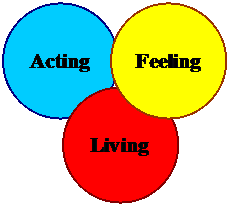Ethical Competence
As we emerge from simple compliance with local moral traditions, confined to the communities that shape and uphold them, as we enter into a world in which a single person working on a computer at home or in a small experimental laboratory in the garage can affect the lives of many unknown persons, ethical illiteracy and incompetence is becoming an ever more dangerous deficiency.
In a simpler world of clubs, single-action guns, one-poison-per-tea-cup, and oppression of a few fellow villagers, localized morality and ethical irresponsibility were not much of an issue. Now a single terrorist or thoughtless person can wreak havoc on a multitude of human beings whose reactions would usually to be too late. We need to focus preventative ethics for our whole world community as well as on our interactions in highly mobile communities. Ethical relativism and the endless debates of how we can be sure of anything is ethics are a luxury that we can no longer afford.
There are some concepts that are fundamental to ethics that we need to be clear about or we may end up inflicting untold miseries on each other or find ourselves enforcing ever more stringent rules and restrictions until the very idea of living as human beings with one another will have been eliminated.
Ethics is about persons, living as persons with other persons.
Ethics is only indirectly related to how we relate to things; essentially, it is about not treating persons as if they were things or even less than things.
Basic Principles of Ethics (BPE).
To act ethically is about not violating or infringing upon the personhood of others, and ideally, about standing in a positive relations to other persons.
On this foundation we can build the following principles. These principles are easy to state, but are often complex in their application to specific situations. In general, we can think of our basic obligations to other persons under the following three main headings. Below them are listed some examples of what each means concretely.
I. Do not eliminate another person as person.
- Do not kill another person.
- Do not harm or incapacitate another person.
- Do not hurt another person.
II. Respect Others.
- Protect other persons from danger to their lives
- Enable persons who have been harmed or incapacitated.
- Support persons who have been hurt.
III. Live in harmony with other persons.
- Establish mutually supportive patterns that make life safer for all.
- Create with others patterns of action that increase the range of actions for all
- Enhance a mutual awareness and responsiveness to each others feelings.
Brief Justification of the Basic Principles of Ethics (BPE).
Whatever else persons are, they have three aspects that are so fundamental to their personhood that without them they can no longer be viewed as full persons.

Since ethics is about persons and persons become less than persons to the extent to which their ability to live, act and feel is limited, all actions that go against these fundamental qualities of human life are unethical, while those that respect them or live in harmony with them are ethical.

